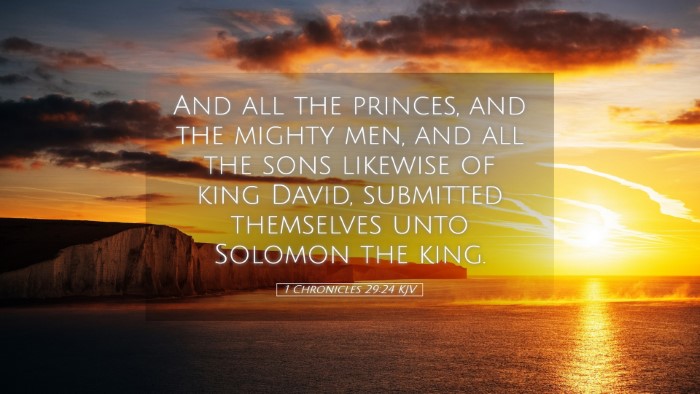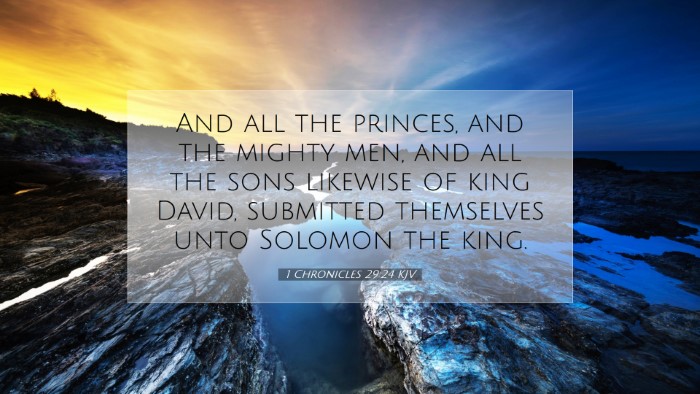Commentary on 1 Chronicles 29:24
Bible Verse: "And all the princes, and the mighty men, and all the sons likewise of king David, submitted themselves unto Solomon the king." (1 Chronicles 29:24)
Introduction
This verse marks a significant transition in the leadership of Israel, highlighting the unity and submission of David's officials to Solomon. It reflects the fulfillment of God's promise concerning the continuity of David's lineage and establishes Solomon's authority as king.
Contextual Overview
In the preceding chapters, David has made extensive preparations for the building of the temple, entrusting the project to Solomon. This context is crucial in understanding the political and spiritual atmosphere during Solomon's ascension.
Historical Significance
The moment captured in 1 Chronicles 29:24 signifies not just a change in kingship but also the collective spirit of the people and leaders of Israel. The principles of unity and respect for divinely appointed authority are foregrounded.
Commentary Insights
Matthew Henry's Commentary
Henry emphasizes the theme of submission as a vital characteristic of the new king's reign. David's successful transition of power serves as an example of how godly authority should function within the community:
- Divine Approval: Solomon’s ascension is portrayed as an act of divine sanction.
- Unity in Leadership: The shared submission of princes and mighty men indicates a collective recognition of Solomon’s position.
- Role of David: David’s preparations for Solomon are significant; he ensured that the appointed task of building the temple would be fulfilled under divine blessing.
Albert Barnes' Notes
Barnes provides insights into the nature of the allegiance expressed by the leaders of Israel:
- Legal and Moral Obligation: The leaders' decision to submit arises not merely from coercion but from an understanding of moral obligation to follow God’s chosen leader.
- Tradition and Continuity: This act of submission reflects a tradition in Israel of honoring the Davidic line, thus preserving the covenantal relationship with God.
- Strengthening National Unity: Barnes underscores how this act strengthens national unity, essential for the stability of Solomon's reign.
Adam Clarke's Commentary
Clarke further delves into the individual characters of those submitting and the implications for the nation:
- Influence of Leadership: Clarke notes how the character of David influenced his subjects, leading them toward willing submission to Solomon.
- Spiritual Awareness: The significance of recognizing God's choice in the matter is underscored, illustrating that true submission should stem from spiritual conviction.
- Preparation for Future Challenges: By unifying under Solomon, the leaders better prepare the nation for future trials that would test their devotion to God and the temple.
Theological Implications
This verse invites reflection on the nature of authority and leadership in the context of the Christian faith:
- Submission to Authority: The lesson of submitting to divinely appointed leaders is significant for believers, indicating a broader principle of respect for leadership.
- God’s Sovereignty: The transition highlights God’s sovereignty over the affairs of men and nations; it serves as a reminder that all authority is ultimately derived from Him.
- Future Generations: This moment establishes a legacy of faithfulness and unity that is crucial for the generations to come, particularly in the context of maintaining spiritual integrity amidst potential conflicts.
Conclusion
1 Chronicles 29:24 encapsulates a pivotal moment in biblical history where the themes of divine providence, leadership, and communal unity converge. The submission of the leaders to Solomon not only sets the stage for a new reign but also reinforces the importance of acknowledging God’s hand in leadership transitions. For pastors, students, theologians, and scholars, this text serves as a reminder of the sacred interplay between divine authority and human responsibility in the governance of faith communities.


